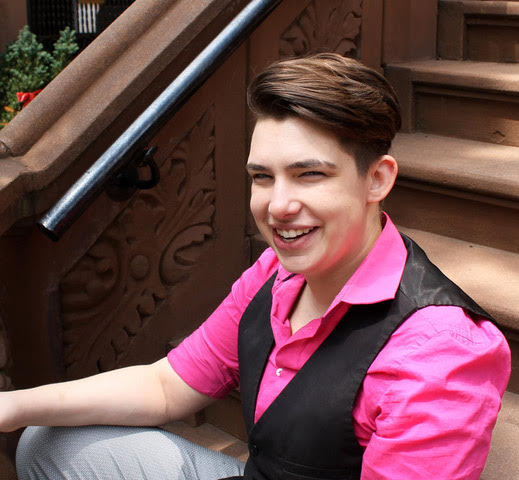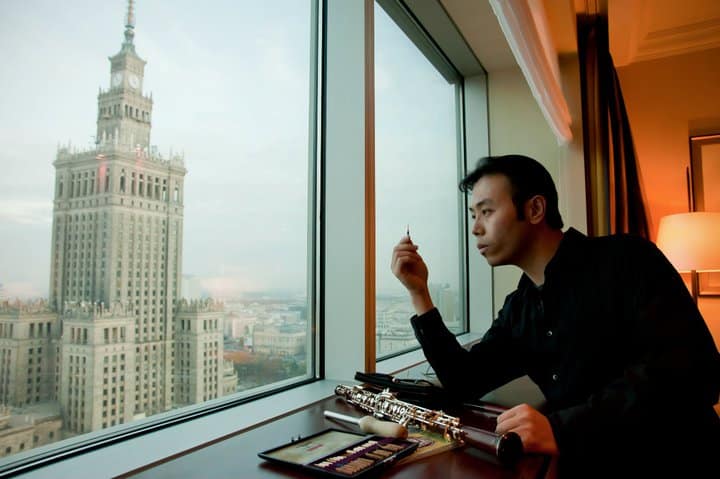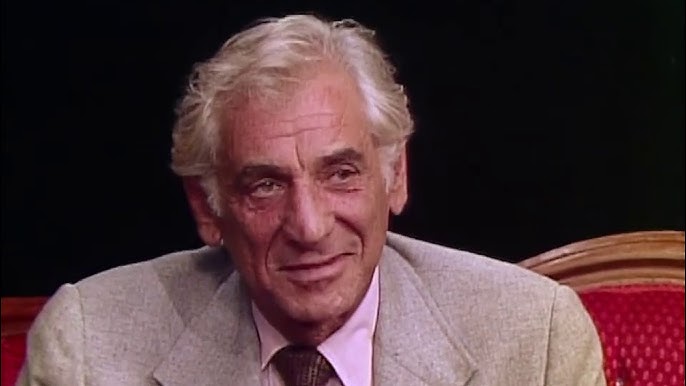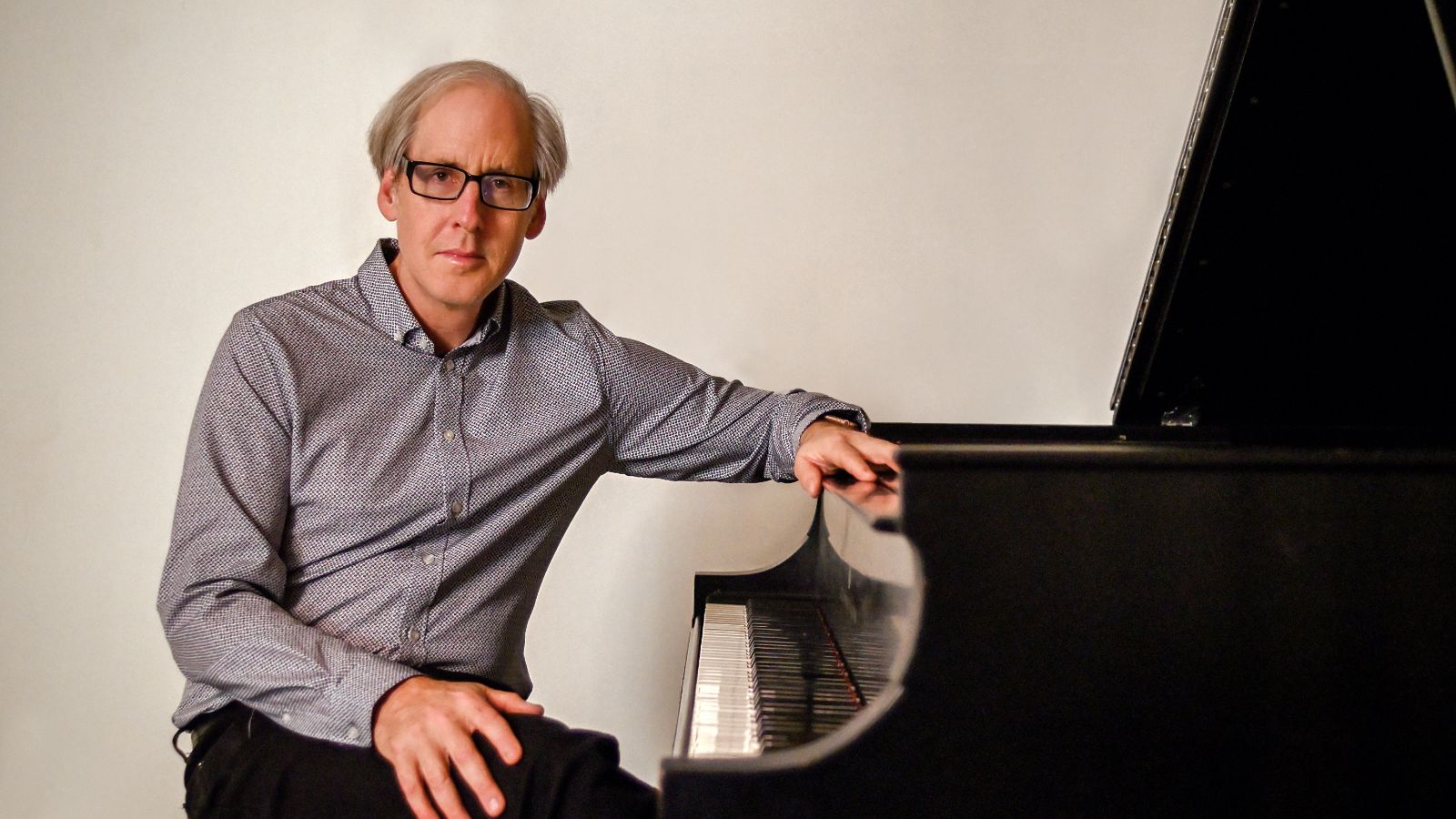File under: Trans piano music
NewsA publicist has pitched us this:
Aiden K. Feltkamp has curated the first-ever volume of vocal and piano music written for and/or by transgender and nonbinary people, Anthology of New Music: Trans & Nonbinary Voices.
Aiden K. Feltkamp (they/he) is a Turn the Spotlight fellow and graduate of Bard College Conservatory’s Graduate Vocal Arts Program. It was their idea to build a collection of vocal and piano music that, rather than focusing on a particular instrument or voice type, centered on identity.
There’s more:
NewMusicShelf is proud to release the first-ever volume of songs written for and/or by transgender and nonbinary people, Anthology of New Music: Trans & Nonbinary Voices. The collection presents composers who highlight the multifaceted intersections unique to the lived experiences of transgender and nonbinary people and stands as a declaration that despite the many historical attempts to isolate them, these communities will not be silenced. Their voices are beautiful, and through printed compositions, the anthology spotlights these important artists so that the world can recognize and revel in their beauty. NewMusicShelf Anthology of New Music: Trans & Nonbinary Voices, Vol. 1 is published by Dennis Tobenski and curated by Aiden Feltkamp. It is available now on NewMusicShelf.com, Amazon, BarnesandNoble.com and wherever books are sold.
“As a trans nonbinary singer, I often found opera and musical theater compositions to be aggressively gendered and binary,” reflects Aiden Feltkamp. “I was at a loss for repertoire that spoke to me.”
They approached Dennis Tobenski, a composer and vocalist who was running a boutique music publishing company in New York City, with the idea to build a collection of vocal and piano music that centered on identity.






Good for them! It’s always a positive when we get the chance to celebrate the diversity in the musical world. There are so many different types of people/styles/genres etc and ALL should be welcome. I applaud this album
Are there already official volumes of plain old LGB music?
Oh for goodness sake who the hell cares? Why do people have to tell you their sexuality these days?
The more of sexuality in public space, the less of it in the bedroom. This is now becoming a scientific conclusion.
This is not sexuality, this is gender. One of the reasons it matters is that it celebrates and uplifts a large population that has been previously been shamed and ostracized. This helps other non-binary and trans people feel that they matter and be proud of who they are.
Large?
“This is not sexuality, this is gender.” You are right, of course, but people confuse them, and one of the reasons for that may be the near-ubiquitous use of the “LGBT” initialism, which seems to promote the false idea that there is little or no difference between being a gay man and thinking of yourself as a woman.
Always thought it was a great sandwich….
Only to people haven’t noticed that there are four letters and that G is not the same letter as T.
Because it was literally ILLEGAL for many of us for years up until recently to just be ourselves. And so now we want to celebrate it, and make up for lost time. There is also still plenty of issues that we want to fight for and raise awareness for. I’m sure you can understand that. Nobody is forcing you to listen or read about this, so you can simply get on with your day if you don’t want to hear about it.
Homosexuality, especially male homosexuality, was certainly illegal in many places quite recently and in many other places still is, but what *else* are you thinking of when you say “it was literally ILLEGAL for many of us up until recently to just be ourselves”?
Gay marriage for one, Paul. Conversion therapy too.
Since you emphasised “illegal” by “literally” and putting it in capital letters, I thought you meant forbidden by law. In any case, being gay is very different from being trans, so mentioning same-sex marriage doesn’t give us examples where transgender/non-binary people fell foul of the law. As for conversion therapy, I think we need to distinguish what that means as regards gay people from what it means as regards transgender/nonbinary people.
seems shoved down our throats. seems more like mental illness rather than biological science, pat.
But we hear about it the whole time. And so many of us just don’t care. Enough agendaism already.
“We hear about it the whole time”. Our society is full to the brim with references to being straight, mate. But you don’t notice because it’s normal to you. Straightness is everywhere. But the minute you start seeing non-straight things around you, you’re getting your knickers in a twist. Sounds like homophobia to me.
How can it be homophobia when trans people are so busy explaining (sort of) how it is they are not gay, and that there is a difference between “G” and “T”?
It’s not homophobia in most cases — I grew up in the theatre, which was heavily populated by gay people, and it was as normal as breathing to me.
Most of us are very happy that people who are not straight or white or fully able physically or mentally have equal rights, opportunities, treatment, etc.
What I, and I believe many, are fed up with is the shrill demands of what is a very small minority that impinge on the hard-won rights to the same equality of rights, opportunities and treatment as over half the human race. The need to diminish and demean what has been seen as perfectly normal for over two millennia.
And the utter inability to see that this political approach to sexual identities has burst upon us in the last few years and may take a little getting used to. And that the best way to be accepted might NOT be by running roughshod and mouthily over those who hesitate, let alone disagree, that they should let anyone who chooses to “identify” as he pleases can use our washrooms, compete in our sports, adopt our hard-won rights, then turn around and declare that WE must change our identification to include the preposterous “cis” and accept that we are just “people who menstruate.”
What ever happened to “do unto others”?
This thread is about an initiative in relation to being transgender or nonbinary. Straightness and homophobia have nothing to do with that. Once again, being gay is not the same as being trans/nonbinary. If someone crigticises an initiative in relation to trans/nonbinary people that cannot be homophobia.
Bravo! It is the right way for more acceptance and equality to create new things yourself than to put ideological garbage on dead composers and their works. Let’s give our friends about 300 years now and see what prevails in the end, whether Mozart, Beethoven and Wagner still fill the concert programs overrepresented.
Let’s see…. “Mozart, Beethoven and Wagner”…
— All white hetero males! No chance
Mozart, Beethoven and Wagner were Master Musicians. Music is about music. Praise God.
Given the long tradition in opera of cross-dressed/trouser/skirt/travesty roles, it’s surprising Feltkamp couldn’t find any music that fit.
Besides, is it one’s own identity one expresses onstage, or that of the character being represented/sung?
Why are people taking identity in classical music so literally? Music is a stylized form of human experience, and the Western classical tradition is filled to the brim with binary and non-binary components, enough to offer identity-forming relief for anybody. As no other art form, Western classical music demonstrates the stylized continuum of gender fluidity in such a way, that no single human being of any gender nuance, be it ever so minimal, needs to feel excluded, discriminated against, treated unfairly, offended, humiliated, or worse, by the music. It is merely a matter of listening what is there, which is better than using music to signify labels which are located outside music altogether. This repertoire offers effective escape from all the silly labelling of ignorant people, of which Western society is infested to a degree that even worries the Vatican.
So, we have in Renaissance music the entirely integrated continuum of polyphony which has differently-identified voices with their own character harmoniously combining with other voices, alternating with blocks of chordal writing where all voices are (voluntarily!) subdued to one upper voice, and nobody complains. In Baroque music most of what we hear is non-binary, in one regular flow where identified voices are interchangable, while sometimes the first shades of binary thinking pops-up (as in the famous aria ‘Erbarme Dich’ in Bach’s St Matthew’s Passion). In the classical period (Haydn, Mozart, Beethoven, Schubert) we seem to see a dangerous urge towards binary expression, blocks of themes separated from each other in character, forming sharp contrasts – but lo and behold: they engage affectionally with each other and, after some exchange of bitter words, find a harmonious resolution at the end of the movement. Also we sometimes find the remarkable expression of threesomes in the scherzi where three identities engage in lovingly exchanges, and yes it works. With the Romantic Period, emotional involvements go wild, crisscrossing a continuum where any identity freely mixes with any other variation, finding a culmination point in Wagner’s operas where any form of nonbinary and binary element splashes around in uninhibited abandonment. And this is not the end of it: you can also dissolve any of your identity-components in Debussy’s nature painting ‘La Mer’, returning to the primeval state of emotional unity where any sense of identity is happily dissolving.
Next lesson: the 20th century, if time permits.
This is brilliant.
Thank you Mr.Borstlap. This is exactly what I expect from you: an erudite, literate, slightly sardonic and ever so slightly subversive analysis, aided , no doubt, by years of serious scholarship, creativity and peaceful, harmonious co-existence with your alter ego Sally.
I am eagerly awaiting part two.
Respectfully
MM
Channeling Susan McClary? I hope. Because if this is serious…
I wonder which combination of sounds on a piano identify as trans, intersex, queer, and/or non-binary.
Be sure that LGBT(??) will find a way to answer that along with the help of PSYs who have,masters in that field!!
As long as there are people who tell you that C-major is green and B-major is red, and all sorts of other colors connected to other major and minor keys – why not a non-binary sound as well? Doesn’t sound any more far-fetched to me.
“Centred on identity…”
I can just hear their warm-ups: “Mi, mi, mi, mi, mi!”
I do not go to Lucia di Lammermoor expecting to “identify” with the heroine just because I am female and Scottish. if I had the voice to carry it off I would love to be able to sing the role, or Marguerite in Faust, or Liu in Turandot. I do not find these roles to be “aggressively gendered,” and I do not know what “binary” means in the context of the plaintiff except that the roles are female. I don’t know precisely where the “aggression” comes in. Is the suggestion that having romantic doings between men and women is essentially (as opposed to specifically in some instances) “aggressive” merely by existing?
If that’s the stance, I may have to rethink my attitude. I have been hostile, as I indicated in the other recent thread about this “large,” “overlooked” group because of their attitude to women. But attitudes like this exaggerated self-pity makes me wonder if I should be afraid of them (pl). Attitudes like this about innocent genderless musical notes suggest that I am being”aggressively gendered and binary” merely by existing.
The decline of music is on its way.
You are probably a century too late with such a comment
Possibly-and you might be ahead but that does not make music greater you know.
Music has to go through whatever the sexual orientation,the race orientation.
The bad thing(to me anyway) is why make such a fuss about this.This is political .
no
The identifiers “she/her” , “he/him” “they/their” and so on would all be better “I/I” “me/me”
What is the difference between a trans singer and a trans non binary singer? Maybe I should be reading the NY Times more? I really don’t understand why any composer, no matter what their sexual or gender preference might be would think that their_____ (fill in the blank with your own PC noun) has anything to do with the music that they write or play. Compare the music of straight composers or players. What does being straight have to do with their music? And why not mention gay lawyers, trans pilots etc.. Does their sexuality have anything to do with their work?
One advantage to having groups of composers and players of the aforementioned sexual persuasion is that they could have concerts of works written by themselves, possibly being of interest to a like minded audience in which they could all mingle and socialize, and maybe even hear some good music.
In pilotry, being trans has already been accepted for years, and nobody complains, not even at Transavia.
https://www.transavia.com/
In the transport world, where going from A to B and further, trans is the normal state of affairs, so it’s society which should take notice and take such easy-going as an example. In music life however, except for performances of Schoenberg’s ‘Transfigured Night’ (about a secret nightly operation), transformations are still a shadowy phenomenon.
Well, not Manhattan Transfer…or the Trans-Siberian Orchestra…
Don’t gt me started on the miracles of the Roman Catholic Mass!
I can just hear the definition form the Uxbridge English Dictionary (I’m Sorry, I Haven’t a Clue) of “translation.”
I think in this case – an album of vocal music – gender (and trans identities) is pretty transparently important. Voices are gendered and vocal parts are gendered; without roles suited to their ranges, many people don’t have roles/rep that can actually allow them to show off their craft (or even just explore its potential and believe their might be a professional avenue for it).
You don’t have to listen, but from a structural point of view, the canon and performing arts institutions are well set up to continue casting women who sing in high vocal ranges and men who sing in low vocal ranges (aside from the occasional countertenor role). So where’s the rep for transwomen with a lower vocal register or for transmen who may sing in a higher vocal register? That rep doesn’t exist, which is a problem because it means there’s no real way for those folks to climb up in the ranks of professional performers, even if they’re GREAT at what they do and bring something truly interesting and compelling to the craft.
In general, there are a few superstar opera/classical singers and many more professional opera/classical singers who are pretty great and make their way as working musicians in more regional and steady ways. Because of the lack of repertoire for men with higher voices (i.e. transmen – who you might think of as born female) and women with lower voices (i.e. transwomen – who you might think of as born male), those people – who may be totally on par with the many “pretty great” singers who make it as working musicians – don’t have enough casting opportunities to even make it as pretty great working singers. Opera is always limited by casting potential — and while there might be some prominent examples of creative casting, that still only helps “superstar” moments. Creating rep and roles that transfolks can actually sing and making more of them means that those singers can actually feasibly be working musicians in an area they love.
Classical music/opera is both an artform AND a workplace/industry. And on the side of the latter, casting (and limitations on who can get cast as what — including limitations on gender and race in roles) is a structural barrier to many people being able to actually enter the industry.
Who I might “THINK OF” as born female/male? Yikes.
How about “who WERE born female/male”? i.e. a FACT?
Or are they (pl.) to dictate how we read actual historical truth now? ANyway, how can anyone be “trans” if they(pl) were not born to a sex they opted to reject?
If you read my whole post and that’s the only thing you chose to engage with, then you should keep enjoying the hole you’ve decided to live in. Some of us above ground are trying to have conversations.
I actually thought your musical points were the most interesting and probably valuable contribution yet to this discussion. But you have joined the woke in unquestioning acceptance of the language some people CHOOSE to employ, which has had the effect — which seems to me quite successful — of intimidating others.
I have no objection to anyone living their lives as they choose. But there seems to be a cadre out there — small, but VERY aggressively vocal — that undertakes to gain what they (wrongly) think of as acceptance — it’s compliance — by demeaning others in every possible way, starting, hypocritically enough, with THEIR self-identification.
I do not dictate how others live their lives. They will not dictate my abuse of the English language to accommodate their ideas. Your reply to me shows the extent to which accommodating woke language sidelines the real conversation.
There is no such thing as trans or non-binary. People cannot change sex, even if they cut their hair, wear dresses or chop off body parts.
It’s a fiction. Humans are a sexually dimorphic species – therefore there are only men and women.
Trans and gender woo-woo are a nonsense, funded by Big Tech and Big Pharma. And many of us know what the end game is. The classical music industry should not pander to this dangerous ideology.
Just to help you out: ‘gender’ is a psychological thing, ‘sex’ is a physical thing. Or at least, so it is said.
Life was simpler when gender was a grammatical thing.
The use of it as an alternative to the word “sex” pretty much gained currency in the late 60s or early 70s in a metaphoric characterisation of feminist writing as being about “gender politics”. It caught on in puritanical America where the word “sex” raises hackles but these damn’ feminists had to be fought back, which meant discussing them.
From there the discontended had a base for further identifying themselves in increasingly creative ways. For instance: https://abcnews.go.com/blogs/headlines/2014/02/heres-a-list-of-58-gender-options-for-facebook-users
Somebody please tell me we do not have to raise out children with this fantasy world.
How can this project proceed using such a discriminatory, binary instrument: a piano has only white keys and black keys.
The majority of white keys is a clear demonstration of white privilege and should be put in balance.
It would be helpful to put a sample of the anthology on the internet so people can hear what this means. I can see identifying a composer as this or that, but the printed note on the page is neutral. Anyone can sing or play it.
“I often found opera and musical theater compositions to be aggressively gendered… ”
I dunno…all those baroque and classical operas with male sopranos seemed to be pretty loose about their gender expectations.
There is no gender-bending / gender fluidity at all in, say, Mozart’s operas. As an agent of heteronormative aggression, he could have never conceived of a male character sung by a female singer. And then there is, worse yet, Beethoven, who famously expressed his inability to climax, impotence and resulting sexual frustration and desire to rape in the horribly violent (and horribly heterosexual) recapitulation of the first movement of his Ninth Symphony. He would have been incapable of feeling ambivalent about whether to call his one and only opera Leonora or Fidelio, let alone of making the main character capable of personifying both stereotypically male and female characteristics/roles, or of conceiving of the possibility that a woman – in drag, no less – would ever be capable of rescuing a man. Nope, two of the three greatest composers in the history of Western classical music were ruthless heterosexist men who never conceived of anything so progressive as gender-bending and fluidity. Thank heavens we’re finally able to introduce such brave and groundbreaking notions thanks to the brave folx of the LGBTQXYZ Inc. movement. Never would have occurred to Mozart and least of all to the most aggressively male of all composers, the dastardly Beethoven.
Good for them. I can only chuckle at the exaggerated pearl-clutching responses to this. The life experiences of composers inform their music. Would Tchaikovsky, Copland, Britten or Bernstein have written the same way (or at all) had they been straight? Probably not.
Nonsense.
Any form of life experience can inspire the music of composers. As soon as experience is transformed into music, it looses its specific, literal content and in this way becomes accessible to anybody. Music is not about the ‘what’, but about the ‘how’, so it can be related to any experience which shares the ‘how’.
Is Wagner’s intense suffering in Parsifal’s music the result of indigestion, the pile of unpaid bills, imagined insults by Jews, the hopelessness of the world or Cosima’s catholic mood swings? It does not matter, he applied it anyway under the plot of his bizarre story and listeners relate to the expression rather than the plot. So it is with Tchaikovsky, Britten, etc.
Lesson 2: identity in 20C music.
It is a short one, since only two tendencies are to be seen, or rather heard: one, music which has identities based upon traditional ideas of expression in the wake of late romanticism, impressionism or neoclassicism; and two, a watered-down level of identity – neither binary nor non-binary, nor trans, nor whatsoever, resulting in sonic art which cannot have identity because it is only about sound and sound patterns. Hoever hard you try to listen to it, there is no identity discernable of whatever kind.
But the first category is full of it: in Ravel we hear the struggle between a sharp, masculine intellect and a suffering, tender, feminine sensitivity. In Prokofiev we find an optimistic and carefree masculine attempt constantly being undermined by feminine insecurity: tonal contexts going off the rails, which makes beautiful music. Stravinsky fled the hell hole of masculine Russian massacre to find salvation in a cool imitation of rationality, which nonetheless resists analysis by any rationality. Schoenberg however, got upset by the betrayal of his wife who flung into the arms of his painter friend Gerstl, so his deeply-wounded masculinity found a bitter outlet in ever more dissonances, leading to atonal suffering of his male ego. We skip a couple of decennia and land at Pierre Boulez, who – after a suicide pact with his lover which went totally wrong, decided to simply shed all of his feminine identity parts and became the first composer with only half of his humanity. There is much more, but we will leave that project to Dr Hofstadter of TIT who has already called me and proposed a new, worldshaking project on musical diversity with the (working-) title: ‘We are not what we always thought to be’.
On form, Mr. Chips!